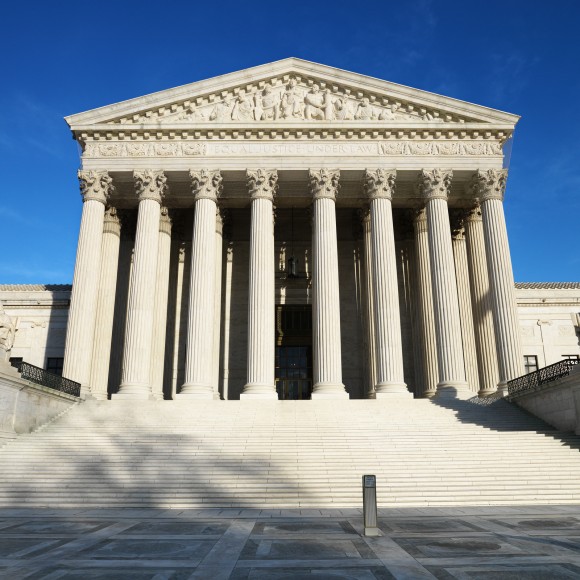The U.S. Supreme Court may not be done with Obamacare yet.
With appellate courts reaching opposite conclusions on the same day about a crucial financing provision of the 2010 law, a third showdown before the justices is probable.
Splits among the federal circuits have preceded previous high court rulings on the Affordable Care Act. In 2012, the law was narrowly upheld when the court ruled Congress has the power to make Americans carry insurance or pay a penalty. Last month, the court said private companies can claim a religious exemption from a requirement that they offer birth-control coverage.
“If there’s a split, the Supreme Court will definitely take it,” said Walter Dellinger, a former solicitor general during the administration of President Bill Clinton. He declined to forecast how the court might rule.
Cornell University law professor Michael Dorf said that if the Supreme Court hears the matter, the same justices who upheld the law two years ago will probably do so again.
The split turns on a section of the act about whether tax subsidies are available to needy participants in the federal health plan exchange, which covers 36 states that don’t have their own. A Washington court yesterday struck down an Internal Revenue Service rule providing such subsidies, saying the act clearly restricts the benefit to the 14 state-run marketplaces.
A few hours later, a Virginia court held that, while the language of the health care law is ambiguous, the IRS had the discretion to write rules for it.
Larger Panel
The Obama administration said it would ask a larger panel of judges to review the Washington court’s decision. Dellinger said that, if the full District of Columbia circuit aligns with its brethren in Virginia, the Supreme Court “could just leave this alone where Congress intended it.”
Dorf said the Washington court is “reaching.”
“Congress could not have possibly intended that there be no subsidies on the federal exchanges,” he said.
Yesterday’s rulings apply to a portion of the law making financial aid available to income-qualified people who buy their health insurance on a marketplace “established by the state.”
The government contends that, when considered with other parts of the law, this language covers marketplaces set up by states themselves — and by the federal government when it acts in place of states.
Made Explicit
The IRS in May 2012 issued a rule making that point explicit. Financial aid, in the form of tax credits, would be available for taxpayers who obtain coverage on the federal exchange because that “is consistent with the language, purpose and structure” of the Affordable Care Act, according to the regulation.
If the Washington ruling is upheld, it may hamstring Obamacare since the plan’s success turns on enlarging the pool of the insured, including those who need financial aid, to cover insurance costs for those who are ill.
Of the more than 8 million people who picked an insurance plan on the exchanges from October through April 19, 5.4 million selected one from the federal marketplace, according to a report by the U.S. Department of Health and Human Services.
The HHS report also showed that 85 percent of those picking a plan qualified for subsidies that reduce their premiums.
‘Textualism’
The Washington court is applying an extreme form of legal reasoning called “textualism,” in which they simply apply the meaning of a statute’s words as written, and not to fulfill the statute’s purpose, Dorf said.
“If there’s not an en banc reversal at the D.C. Circuit, the Supreme Court has to take the case,” Dorf said. “This is too important an issue just to leave it there.”
If they do so, Dorf said, he forecasts that the same justices who ruled in favor of the Affordable Care Act in 2012 may do so again, “and Obamacare lives to fight another lawsuit.”
Dellinger was more blunt.
‘This challenge turns law into a perverse game, a game in which litigants seek to deny health care coverage to millions of working class Americans by coming up with pettifogging arguments designed to defeat what the elected representatives clearly sought to accomplish,” Dellinger said in a phone interview. “The Congress that passed the Affordable Care Act could not have intended utterly absurd result, much less unambiguously required it.”
A 2013 ruling written by Justice Elena Kagan, who was in the majority that upheld the health care law the year before, may foretell a negative result for supporters of Obamacare.
In Michigan v. Bay Mills Indian Community, Kagan wrote “this Court does not revise legislation, as Michigan proposes, just because the text as written creates an apparent anomaly as to some subject it does not address.”
Unlike yesterday’s cases, though, the Michigan decision didn’t involve a federal agency’s interpretation of a law passed by Congress.
The Washington case is Halbig v. Sebelius, 14-5018, U.S. Court of Appeals for the District of Columbia (Washington). The Virginia case is King v. Sebelius, 14-1158, U.S. Court of Appeals for the Fourth Circuit, (Richmond, Virginia).
–With assistance from Peter Gosselin and Brian Rye in Washington.
Topics USA Legislation Michigan Washington Virginia
Was this article valuable?
Here are more articles you may enjoy.



 Palantir Decamps to Miami Co-Working Space in Surprise Move
Palantir Decamps to Miami Co-Working Space in Surprise Move  Insurance Broker Stocks Sink as AI App Sparks Disruption Fears
Insurance Broker Stocks Sink as AI App Sparks Disruption Fears  Experian Launches Insurance Marketplace App on ChatGPT
Experian Launches Insurance Marketplace App on ChatGPT  CFC Owners Said to Tap Banks for Sale, IPO of £5 Billion Insurer
CFC Owners Said to Tap Banks for Sale, IPO of £5 Billion Insurer 

